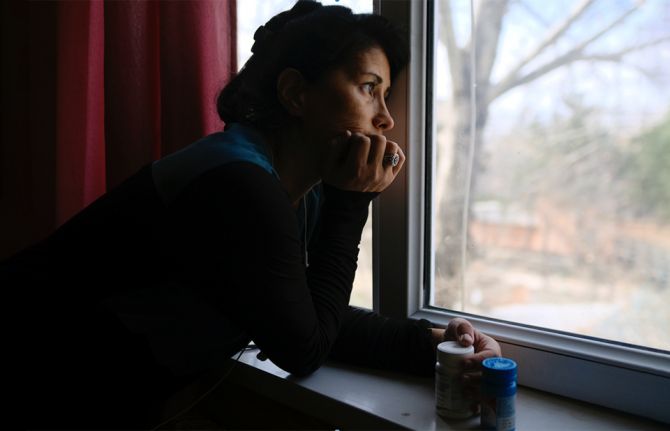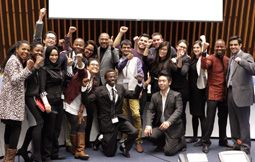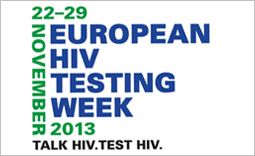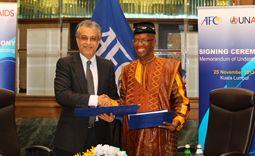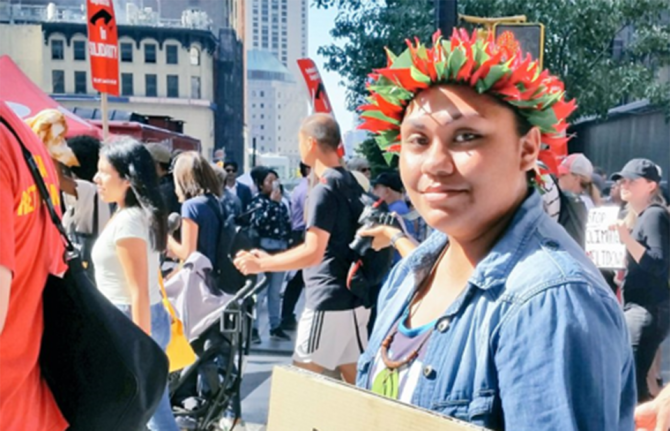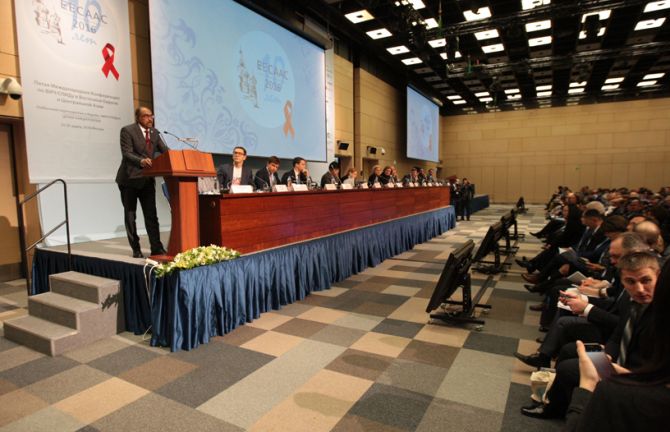
Feature Story
Strengthening and expanding HIV legal services
06 May 2009
06 May 2009 06 May 2009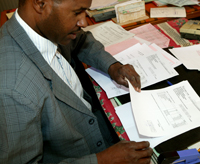
People living with or affected by HIV often require practical assistance to maintain adequate housing, keep child custody, enforce property and inheritance rights, or access health care, education or employment without discrimination.
Credit: UNAIDS/P.Virot
Experience in the response to AIDS has shown that access to legal services is an important part of guaranteeing protection from discrimination, getting redress for human rights violations, and expanding access to HIV prevention and treatment. Yet such programmes are not sufficiently supported by national AIDS responses, and where they do exist, quality and scale are often insufficient.
The International Development Law Organization (IDLO), the UNAIDS Secretariat and the United Nations Development Programme (UNDP) hosted an international expert consultation on strengthening and expanding HIV legal services at IDLO headquarters in Rome, 3-6 May.
Meeting participants contributed to the development of tools for improving access to legal services for people living with HIV and key populations at higher risk of HIV infection, particularly those in low- and middle-income countries. The tools will support countries to develop and strengthen programmes and proposals for funding, including to the Global Fund to Fight AIDS, Tuberculosis and Malaria.
Susan Timberlake, Senior Human Rights and Law Adviser with the UNAIDS Secretariat, explains that UNAIDS advocates that access to justice must be a basic, programmatic component of the movement for universal access to HIV prevention, treatment, care and support. “The persistent reality of discrimination – whether due to HIV status, gender, or social status – means that legal services are a critical and necessary part of a comprehensive response to the epidemic,” says Timberlake.
People living with or affected by HIV often require practical assistance to maintain adequate housing, keep child custody, enforce property and inheritance rights, or access health care, education or employment without discrimination. Access to legal services is even more important in punitive legal environments. An increasing number of countries are passing overly-broad laws to criminalize HIV transmission. Men who have sex with men, sex workers and people who use drugs face criminal sanctions in many countries, blocking access to HIV services and heightening HIV vulnerability. According to research commissioned in 2008 by the International Task Team on HIV-related Travel Restrictions, some 60 countries deny entry, stay and residence based on HIV status.
No “one size fits all” for legal services
Legal services in the context of HIV take many forms. These include: legal information and advice, including through telephone “hotlines”; formal litigation, including strategic litigation to create legal policy; mediation and other forms of dispute resolution; assistance with informal or traditional legal systems (e.g. village courts); and community legal education. Legal service providers are not always lawyers. They may be paralegals, volunteers, students or peer educators. Such services are provided in a range of settings, including HIV treatment and counselling centres, “mainstream” legal aid centres, as well as prisons and community settings. Work may also be linked to advocacy for law reform.
According to Mandeep Dhaliwal, Cluster Leader on Gender, Human Rights & Sexual Diversities with the UNDP HIV Practice, the rationale for supporting HIV legal services rests on two related arguments. “One, they are essential as a means to protect the human rights of marginalized and vulnerable populations. Two, they are essential as a means to ensure optimal public health and development outcomes – both of which are underpinned by the realization of rights,” says Dhaliwal.
One of our goals as the Joint UN Programme on HIV/AIDS is to support countries to recognize how important legal services can be to their national HIV response, and then work with them to develop a strategy to scale-up these services.
Mandeep Dhaliwal, Cluster Leader: Gender, Human Rights & Sexual Diversities UNDP HIV/AIDS Practice Bureau for Development Policy
However, too often such programmes do not get the support they need. “One of our goals as the Joint UN Programme on HIV/AIDS is to support countries to recognize how important legal services can be to their national HIV response, and then work with them to develop a strategy to scale-up these services,” explains Dhaliwal. “Existing HIV legal services are generally small in scale and patchy in coverage. With high levels of ‘legal’ marginalization of vulnerable populations, the achievement of universal access to prevention, treatment, care and support demands a commitment to legal protection and access to legal services.”
The meeting in Rome supported the development of three tools to improve access to HIV legal services:
- Models of legal services applicable in different situations
- Training curriculum for lawyers
- Resource mobilization strategies.
“There are extraordinary examples of great work being done to provide legal services. We know the importance of providing an enabling legal environment to HIV prevention and treatment access,” says David Patterson, Manager of IDLO's HIV and Health Law Programme, “Why have such legal services not been taken to scale with the same urgency that we seek to provide treatment?”
Participants included legal service providers and leaders of organizations working with people living with HIV, women’s groups, people who use drugs, men who have sex with men and sex workers, as well as representatives from IDLO, UNAIDS, UNDP, and the Global Fund. They came from diverse countries and epidemic settings, including Australia, Botswana, Brazil, China, Denmark, Egypt, Georgia, Guatemala, India, Indonesia, Nepal, Papua New Guinea, St Lucia, Uganda, Ukraine, the United States of America and Viet Nam.
Right Hand Content
Cosponsors:
External links:
International Development Law Organization (IDLO)
Publications:
International Guidelines on HIV/AIDS and Human Rights (pdf, 932 Kb)
Related

Feature Story
Joint action for results: UNAIDS outcome framework, 2009 – 2011
22 April 2009
22 April 2009 22 April 2009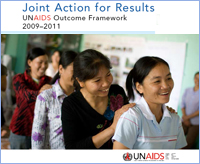
The HIV organizational landscape has evolved and grown more complex over the past decade. UNAIDS, donors and civil society, including networks of people living with HIV, have rightly demanded greater clarity on the relationships between needs, financing, activities and outcomes. Also demanded is greater specificity about the role of UNAIDS and the Secretariat within the wider constellation of actors.
This Outcome Framework, which builds upon the UNAIDS Strategic Framework (2007–2011), will guide future investment and hold the Secretariat and the Cosponsors accountable for making the resources of the UN work for results in countries. It affirms the UNAIDS Secretariat and Cosponsors to leverage our respective organizational mandates and resources to work collectively to deliver results.
Joint action for results: UNAIDS outcome framework, 2009 – 2011 (pdf, 388 Kb)
Joint action for results: UNAIDS outcome framewor
Cosponsors:
Office of the United Nations High Commissioner for Refugees (UNHCR)
United Nations Children's Fund (UNICEF)
World Food Programme (WFP)
United Nations Development Programme (UNDP)
United Nations Population Fund (UNFPA)
United Nations Office on Drugs and Crime (UNODC)
International Labour Organization (ILO)
United Nations Educational, Scientific and Cultural Organization (UNESCO)
World Health Organization (WHO)
World Bank
Publications:
Joint action for results: UNAIDS outcome framework, 2009 – 2011 (pdf, 388 Kb)
Related

Feature Story
UNAIDS Committee of Cosponsoring Organizations meet
06 April 2009
06 April 2009 06 April 2009
(from left): Joy Phumaphi, Vice President and Head of the Human Development Network, World Bank; Arnauld Akodjenou, Director, Division of Operational Services, UNHCR; Josette Sheeran, Executive Director, WFP; Anarfi Asamoa-Baah, Deputy Director General, WHO; Assane Diop, Executive Director, Social Protection Sector, ILO; Koichiro Matsuura, Director General, UNESCO; Ad Melkert, Administrator ad-interim, UNDP; Ann M. Veneman, Executive Director, UNICEF; Michel Sidibé, Executive Director, UNAIDS; Thoraya Ahmed Obaid, Executive Director, UNFPA; Antonio Maria Costa, Executive Director, UNODC. Paris, 3 April 2009,
The Joint United Nations Programme on HIV/AIDS (UNAIDS) brings together the efforts and resources of ten UN system organizations in the AIDS response. The UNAIDS Committee of Cosponsoring Organizations (CCO) serves as the forum for these Cosponsors to meet on a regular basis to consider matters of major importance to UNAIDS, and to provide input from the Cosponsoring organizations into the policies and strategies of UNAIDS.
On 3 April 2009, the CCO held their first meeting since the appointment of UNAIDS Executive Director Michel Sidibé.
The CCO expressed their full support for “universal access” which Mr Sidibé has outlined as the top priority for UNAIDS as well as the other priority areas of focus which will be set out in the new UNAIDS outcome framework currently being finalized with Cosponsors.
The meeting provided an excellent opportunity to share ideas on supporting countries in achieving their universal access goals. The need for UNAIDS to advocate for an evidence informed AIDS response that is grounded in human rights was accepted by all. Equally important was the need for accountability and results.
The CCO also endorsed the general directions of the 2010-2011 Unified Budget and Workplan including the key priorities and the allocation of resources between the Cosponsors, the Secretariat and Interagency activities. The Secretariat will now work with the Global Coordinators of the Cosponsors to finalize the UBW for the June 2009 meeting of the Programme Coordinating Board.
UNAIDS Committee of Cosponsoring Organizations (CCO)
The CCO comprises representatives from the ten UNAIDS Cosponsors and the UNAIDS Secretariat. It meets twice a year and each Cosponsor rotates as chair of the committee annually, on 1 July.
Right Hand Side
Cosponsors:
Office of the United Nations High Commissioner for Refugees (UNHCR)
United Nations Children's Fund (UNICEF)
World Food Programme (WFP)
United Nations Development Programme (UNDP)
United Nations Population Fund (UNFPA)
United Nations Office on Drugs and Crime (UNODC)
International Labour Organization (ILO)
United Nations Educational, Scientific and Cultural Organization (UNESCO)
World Health Organization (WHO)
World Bank
Related
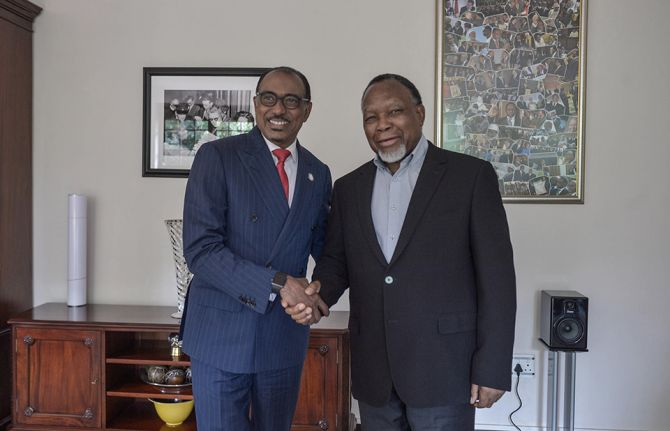 Keeping up the momentum in the global AIDS response
Keeping up the momentum in the global AIDS response

24 April 2019
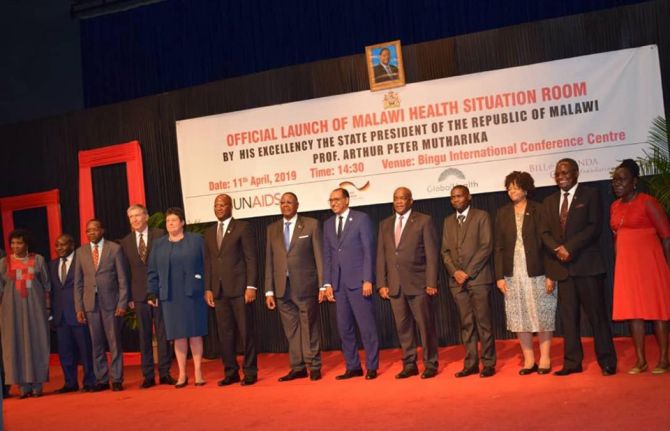 Malawi launches its health situation room
Malawi launches its health situation room

12 April 2019
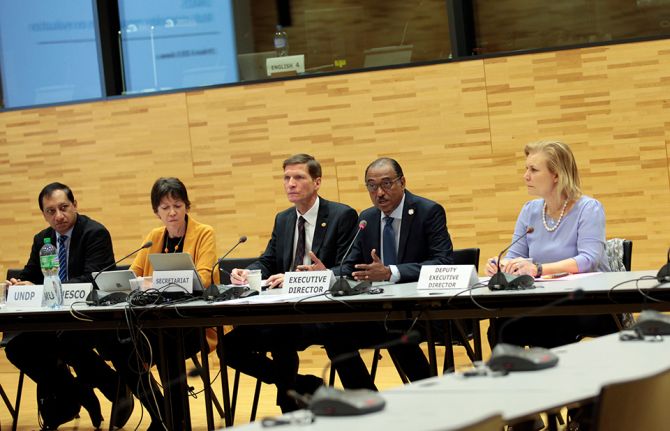 Learning lessons on evaluation
Learning lessons on evaluation

02 April 2019

Feature Story
Greater action needed to protect women’s inheritance and property rights in the face of HIV
13 March 2009
13 March 2009 13 March 2009
Elizabeth Mataka, UN Special Envoy for HIV/AIDS in Africa.
Credit: UNDP
If more women are to avoid HIV infection, laws on inheritance and property rights should be revisited, revised or better enforced. This was one of the key messages emerging from a high-profile side-event on women’s inheritance, land and housing rights in the context of HIV, which took place yesterday, 12 March, during the 53rd session of the Commission on the Status of Women held at UN Headquarters in New York.
The discussion brought together a range of speakers including Elizabeth Mataka, UN Special Envoy for HIV/AIDS in Africa and Rose Gawaya, Senior Gender Adviser of the UNDP HIV/AIDS Practice based in Johannesburg, South Africa. The event focused on reviewing innovative work that has been done to increase women’s access to, control over, and ownership of land and housing in a bid to mitigate the impact of AIDS. Realistic and workable strategies, from the grassroots to international level, were explored.
"Lack of equal rights for women to inheritance and property excludes women from accessing resources that would help reduce their vulnerability to HIV and improve their ability to cope with the consequences of the epidemic."
Elizabeth Mataka, UN Special Envoy for HIV/AIDS in Africa
Ms Mataka highlighted the increased vulnerability of women due to AIDS and called on governments to harmonise often conflicting laws and legislation. She said “Lack of equal rights for women to inheritance and property excludes women from accessing resources that would help reduce their vulnerability to HIV and improve their ability to cope with the consequences of the epidemic.”
The issue of such rights for women is of critical importance in addressing HIV. When a woman’s husband dies from AIDS, she might lose her home and land, inheritance and livelihood. This can leave her in a situation where she is forced to enter into relationships and behaviours that render her more vulnerable to the virus. The panellists contended that when women have enhanced access to ownership and control of land and property rights they have a greater range of choices, are far more able to exercise autonomy and, ultimately, are better able to protect themselves.
As well as the revision or implementation of existing laws on inheritance, the panellists recommended increased access to information and legal experts, enhanced partnerships among organizations working in the area and strengthened networks to raise awareness of the issues, with a focus on grassroots women as critical drivers of change. They also suggested greater use of the media and creative ways of sharing and packaging messages, while highlighting the need to increase the scope of research.
Other participants in the panel included: Jeanmarie Fenrich, Fordham Leitner Centre for International Law and Justice; Seodi White, Women and Law in Southern Africa (Malawi); Esther Mwaura, GROOTS Kenya, Huairou Commission; and Anne Gathumbi, Open Society Initiative for East Africa, Law and Health Initiative.
This event was organized by UNDP, the Huairou Commission and Soros/OSI with support from UNAIDS, GROOTS, ICRW, COHRE, Fordham Law Leitner Center and WLSA Malawi.
Greater action needed to protect women’s inheritance and property rights in the
Cosponsors:
Partners:
Fordham Leitner Centre for International Law and Justice
Women and Law in Southern Africa
Huairou Commission
Open Society Initiative for East Africa
The Global Coalition on Women and AIDS
Feature stories:
Commission on the Status of Women opens with call for action to achieve universal access and gender equality (02 March 2009)
UN Special Envoy for AIDS in Africa Elizabeth Mataka (15 September 2009)
External links:
Commission on the Status of Women 53rd Session
Official documentation
Publications:
An Analysis of the Gender Policies of the Three Major AIDS Financing Institutions: The Global Fund to Fight AIDS, Tuberculosis and Malaria, the World Bank and the President’s Emergency Plan for AIDS Relief (pdf, 166 Kb)
UNIFEM fact sheets on gender-related aspects of AIDS (pdf, 311 Kb)

Feature Story
Highlighting sexual violence on International Women’s Day
05 March 2009
05 March 2009 05 March 2009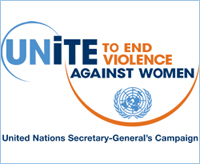
"Women and men: United to end violence against women" is the theme of this year’s International Women's Day which is observed at the United Nations on 5 March 2009 and celebrated internationally on 8 March.
Sexual violence, and the threat of violence, increases women’s vulnerability to HIV and in certain parts of the world is being used as a tactic of war.
UN Secretary-General Ban Ki-moon highlights this in his message marking International Women’s Day: “Violence against women is also linked to the spread of HIV/AIDS. In some countries, as many as one in three women will be beaten, coerced into sex or otherwise abused in her lifetime. Women and girls are also systematically and deliberately subject to rape and sexual violence in war.”
UNAIDS Executive Director Michel Sidibé is also unequivocal on the need to end this violence in his statement: “Violence, including rape and sexual abuse against women and girls should not be tolerated in any circumstances, be it in conflict or war or at home in our own communities.”
Sexual violence in conflict
Sexual violence in conflict has not been a high priority for security institutions and is often overlooked due to stigma and under-reporting. However, the trauma and terror of rape can wound as deeply as bullets and in areas with high HIV prevalence, women are also at risk of being infected with HIV.
Leo Kenny, Team Leader of UNAIDS Security and Humanitarian Response is convinced of the pressing need to address the issue sexual violence among the uniformed services: “While soldiers and uniformed service personnel have been perpetuators of violence against women, they have also been part of the solution and are potential key agents of change if the right programmes are put in place.”
“Educating and involving peacekeepers in addressing sexual violence is important as soldiers have influence among their peers both within the service and the wider community. By changing their perceptions and behaviours it can positively impact the larger population,” Mr Kenny added.
"Violence, including rape and sexual abuse against women and girls should not be tolerated in any circumstances, be it in conflict or war or at home in our own communities."
UNAIDS Executive Director Michel Sidibé
The women who survive sexual violence need access to comprehensive health and counselling services and, where necessary, HIV prevention, treatment, care and support. However the context of civil unrest can result in barriers to universal access to these services.
There is also a need for the millions of uniformed service personnel worldwide to be integrally considered in the scale up towards universal access to HIV prevention, treatment, care and support.
UN Action against Sexual Violence in Conflict
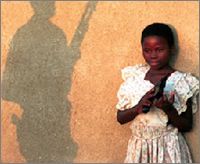 "Women and men: United to end violence against women" is the theme of this year’s International Women's Day which is observed at the United Nations on 5 March 2009 and celebrated internationally on 8 March. Credit: UNAIDS
"Women and men: United to end violence against women" is the theme of this year’s International Women's Day which is observed at the United Nations on 5 March 2009 and celebrated internationally on 8 March. Credit: UNAIDSTwo years ago today, UN bodies came together to form a joint initiative, “UN Action against Sexual Violence in Conflict.” The partnership now stands at twelve UN entities which seek to draw attention to the issue of sexual violence in conflict and the need to do more, to improve the quality of programming to address sexual violence, to increase the coordination of efforts for comprehensive prevention and response services, and to improve accountability as well as to respond effectively to the needs of survivors.
The UN Action initiative is designed to create greater awareness of these abuses and, ultimately, end sexual violence to make the world safer for women and girls.
Three main pillars
The first aspect of this initiative, country level action, involves country level support and efforts to build capacity and train advisers in gender-based violence programming and coordination, as well as support for joint UN programming in selected countries.
Second, “advocating for action”, raises public awareness and generates political will to address sexual violence as part of the broader campaign to “Stop rape now.” The third aspect is the creation of a knowledge hub on sexual violence in conflict and effective responses.
Stop rape now
Rape has deep roots in a historical absence of accountability and UN Action has helped catalyze a paradigm shift: insisting that sexual violence is recognized as a security threat that demands a security response, rather than simply an inevitable byproduct of war.
International Women’s Day
In 1977 the UN General Assembly adopted a resolution inviting Member States to proclaim a United Nations Day for Women's Rights and International Peace—International Women's Day—in recognition of the fact that securing peace and social progress and the full enjoyment of human rights and fundamental freedoms require the active participation, equality and development of women; and to acknowledge the contribution of women to the strengthening of international peace and security.
For women around the world, the symbolism of International Women's Day has a wider meaning: it’s an occasion to celebrate how far women have come in their struggle for equality and an opportunity to unite, network and mobilize for meaningful change.
Highlighting sexual violence on International Women’s Day
International Women's Day 2009 statements:
Statement by UN Secretary-General Ban Ki-moon (pdf, 25 kb)
Statement by UNAIDS Executive Director Michel Sidibé
Statement by WHO Director-General Dr Margaret Chan
Statement by UNESCO Director-General Koïchiro Matsuura (pdf, 61 Kb)
Statement by UNFPA Executive Director, Thoraya Ahmed Obaid
Statement by UNICEF Executive Director Ann M. Veneman
More from UNAIDS Cosponsors on International Women's Day:
Interview with WFP Head of Gender Unit Isatou Jallow
UNDP's special on the occasion of the International Women's Day 2009
UNODC's special on the occasion of the International Women's Day 2009
ILO celebration for International Women's Day 2009
World Bank's special on the occasion of the International Women's Day 2009
Cosponsors:
UNDP - UN Development Programme
UNFPA - United Nations Population Fund
UNHCR - UN High Commissioner for Refugees
UNICEF - United Nations Children Fund
WFP - World Food Programme
WHO – World Health Organization
Partners:
DPA - Department of Political Affairs
DPKO - Peacekeeping Best Practices
OCHA - Coordination of Humanitarian Affairs
OHCHR - United Nations Human Rights
UNIFEM - UN Development Fund for Woman
Feature stories:
HIV prevention and the uniformed services in CIS (08 October 2008)
Contact:
For more information on this campaign contact by email: anna.tarant@unifem.org
External links:

Feature Story
Fashion designer joins hands with HIV positive women in Cambodia
10 September 2008
10 September 2008 10 September 2008This story first appeared on UNDP.org

Fashion designer Bibi Russell (right)
Credit: Shaju John for UNDP
Internationally-renowned fashion designer Bibi Russell, along with UNDP and the Modern Dress Sewing Factory (MDSF), has launched an international designer label "Bibi for WE".
Under this brand, MDSF - an all-women business subsidiary of the network of people living with HIV in Cambodia - will produce and market a range of bags under the "Bibi for WE" international label. These will be designed by Bibi Russell, who was synonymous with leading international designer-labels and fashion-houses of the 1970s and 1980s.
"If you join hands with women living with HIV with affection and confidence, they can create magic with their fingers," said Bibi who is also an APLF (Asia Pacific Leadership Forum on HIV/AIDS and Development) Champion and founder of "Fashion for Development," a movement seeking to help women weavers around the world.
The designs will use local materials such as Cambodian silk and showcase local cultural motifs. Bibi has trained HIV-positive women in the selection of materials, design, finishing and quality control.
"We don’t want sympathy, but support to live a life of respect and dignity," said Pham Srim, Business Manager at MDSF. "Severe poverty and stigma make our lives impossible. We have recurrent health problems and have to fend for our treatment, food and shelter; but the most crushing is the discrimination by society" she said. "With HIV, one can lead a normal and productive life - that is the message of WE," she added.
"WE is a symbol of resilience and resolve by women in the face of ill-health, poverty and discrimination," said Mr. Douglas Broderick, Resident Representative of UNDP in Cambodia. He said the label represents a new hope and empowerment for all the women living with HIV in Cambodia. He urged the private sector and general public to generously support the initiative.
"This project is very innovative and will go a long way to assist women living with HIV in Cambodia to improve their situation," said Jane Batte, UNAIDS Social Mobilization Officer.
UNAIDS and other UN agencies, through the United Nations Country Team (UNCT), will provide advocacy assistance and support in marketing the products on the international market.
Women and Wealth Project
In Asia and the Pacific, the impact of HIV on a household is disproportionately borne by women. In response to the social and economic issues affecting the lives of HIV-positive women, the UNDP Regional HIV and Development Programme for Asia and the Pacific initiated the Women and Wealth Project (WWP) in late 2006, in partnership with a Thai NGO, Population and Community Development Association and UNDP country offices.
Ms. Caitlin Wiesen, Practice Team Leader and Regional Programme Coordinator, Regional HIV and Development Programme, said "Bibi for WE" is a milestone in the evolution of the WWP. "Women and Wealth and the WE brand arose out of the acute necessity of positive women to cope socially and economically with the impact of the epidemic on their lives." Innovation and sustainability are the essential features of the Women and Wealth project, she said.
WWP pursues the empowerment of women living with and affected by HIV through the development of small-scale social enterprises in Cambodia and India. Women participating in the project have expressed increased confidence, dignity, and hope and reduced stigma and discrimination against them. The Modern Dress Sewing Factory (MDSF) started its operations in Cambodia in January 2007. The garment factory employs 17 women living with HIV, including three women who form the management team.
United Nations Development Programme (UNDP) is a Cosponsor of UNAIDS.
Fashion designer joins hands with HIV positive wo

Feature Story
Tokyo Conference on Africa to spotlight AIDS
28 May 2008
28 May 2008 28 May 2008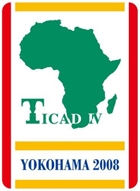
Leaders from Africa, Asia,
Europe and other parts of the
world are in Yokohama for the
4th Tokyo International
Conference on African
Development (TICAD).
Leaders from Africa, Asia, Europe and other parts of the world are in Yokohama for the 4th Tokyo International Conference on African Development (TICAD). The theme of this year’s meeting is “Towards a vibrant Africa” and will focus on mobilizing knowledge and resources to overcome the obstacles facing Africa as it moves its economy and social development agenda forward.
AIDS will be addressed within a session on human security and achieving the Millennium Development Goals. UNAIDS Executive Director Dr Peter Piot will participate in this joint thematic segment to emphasize the response to AIDS as a key element in efforts to achieve the Goals in Africa, from eradicating extreme poverty to empowering women.
With AIDS remaining as the leading cause of death for African adults, HIV prevention, treatment, care and support services need to be scaled up in the next years if the Goals’ targets are to be met by 2015.
This year’s three-day conference is also being used to announce the laureates of the first Hideyo Noguchi Africa Prize, an award established by the Japanese Government to recognize achievements in the field of health services and medical research in Africa. In health services, the award has been given to Miriam K. Were, a Kenyan doctor and chairperson of Kenya's National AIDS Control Council, for her leadership in supporting the country’s response to AIDS, and in medical research, Dr Brian Greenwood of the United Kingdom, for his innovative work on Malaria.
Before TICAD, Dr Piot participated in a symposium in Tokyo earlier in the week on communicable diseases as threats to human security. He joined several eminent speakers including the Japanese Prime Minister Yasuo Fukuda, Global Fund Executive Director Michel Kazatchkine, and UN Secretary-General’s Special Envoy for AIDS in Africa Elizabeth Mataka. The event was organized by Friends of the Global Fund – Japan.
Tokyo Conference on Africa to spotlight AIDS
Cosponsors:
External links:
TICAD hosted by Japanese Ministry of Foreign Affairs
TICAD hosted by UNDP
Hideyo Noguchi Africa Prize

Feature Story
Developing strategies to work with FBOs
10 April 2008
10 April 2008 10 April 2008
The faith community makes a major
contribution to the worldwide response to
AIDS, especially in poorer developing
countries, where faith-related facilities may
be the sole source of health assistance.
Seventy percent of the world’s population identify themselves as members of a faith community, which situates communities of faith in a privileged position to influence people’s behaviour and attitudes, even in relationship with the AIDS epidemic.
Organizations motivated by religious faith - often called Faith-based organizations (FBOs) - have been involved in the AIDS response since the earliest days of the epidemic and have often been among the first to respond, providing services, education and care.
UNAIDS in collaboration with UNFPA, WHO, ILO and UNDP will bring together a working group of partnership officers from across the UNAIDS Secretariat and Cosponsor organizations and FBO representatives to outline a strategy for future work with faith-based organizations on AIDS issues. The meeting, which will take place from 9 – 11 April in Geneva, will aim to establish a strategy for a more coordinated response to partnership work among all stakeholders involved in the AIDS response.
Religious communities, mosques, temples, churches, hospitals and clinics have reached out to provide support to those living with and affected by HIV. Many have been involved in the response since the earliest days of the epidemic. Their leadership has great influence in the lives of many people, and leaders speaking out responsibly about AIDS can make a powerful impact at both community and international level.

Participants will analyse how to best work
with the wide range of FBOs working on
AIDS, discussing the opportunities and
challenges that they offer.
However the response of the religious community can also be negative. People living with HIV have been stigmatized by religious leaders and communities of faith. Approaches to HIV prevention methods and attitudes towards people at increased risk of HIV infection such as men who have sex with men, have sometimes hindered the response. Much work remains to be done to eradicate stigma and discrimination.
The faith community makes a major contribution to the worldwide response to AIDS, especially in poorer developing countries, where faith-related facilities may (in some areas) be the sole source of health assistance. The ARHAP/WHO report (2007) found that faith-related organizations were providing 33 to 40 percent of all HIV health care and treatment services in Zambia and Lesotho, and calculated that between 30 and 70 percent of all healthcare infrastructure across the continent is operated by faith-based groups.
Furthermore, it is clear that faith communities are ideally placed to respond in the broadest way to the epidemic’s challenges, not just as providers of services but also (and perhaps most importantly) as networks and movements that reach right to the heart of community and family life. This makes them key players in a holistic, multifaceted, integrated response to AIDS. It is for this reason that UNAIDS is currently exploring a deeper engagement with ‘faith-based organizations’.
Participants at this meeting will analyse how to best work with the wide range of FBOs working on AIDS, discussing the opportunities and challenges that they offer. The working group will produce a three to five years strategy that will guide the UNAIDS and its cosponsors efforts to consolidate a coordinated response to AIDS with the faith community.

Press Release
UNAIDS/UNDP/WHO concerned over sustainability and scale up of HIV treatment
15 March 2011 15 March 2011UNAIDS, UNDP and WHO encourage countries to use the flexibilities as set out in the TRIPS agreement to lower costs and improve access to HIV treatment
GENEVA, 15 March 2011—The Joint United Nations Programme on HIV/AIDS (UNAIDS), the United Nations Development Programme (UNDP) and the World Health Organization (WHO) are deeply concerned about the long-term sustainability of access to affordable HIV treatment.
In a new policy brief launched today, UNAIDS, UNDP and WHO urge countries, where appropriate, to use the intellectual property and trade flexibilities set out in the World Trade Organization Agreement on Trade-Related Aspects of Intellectual Property Rights (TRIPS), and the Doha Declaration on the TRIPS agreement and public health, in order to reduce the price of HIV medicines and expand access to people most in need.
“We are seriously concerned about the future of HIV treatment programmes,” said Paul De Lay, Deputy Executive Director, Programme, UNAIDS. “Only about one third of people in need have access to treatment. In the current economic climate even sustaining that over the long-term will be a challenge. Countries must use all the means at their disposal, including the TRIPS flexibilities, to ensure sustainability and the significant scale up of HIV services to reach people most in need.”
At the end of 2009, nearly 15 million people were estimated to be in need of antiretroviral treatment for HIV and 5.2 million people had access to the life-saving therapy.
Over the last 10 years the annual cost of a first-line antiretroviral regimen for low-income countries decreased by almost 99%––from more than US$ 10 000 per person in 2000 to less than US$ 116 for the least expensive WHO-recommended first-line regimen in 2010. However, prices are still too high for many low- and middle-income countries, especially for second-line regimens.
"Millions of people in developing countries now depend on a steady supply of affordable first-line treatment for HIV. If their treatment is interrupted, which can lead to drug resistance, these patients will have to switch to a second-line regimen. That can be at least six times more expensive than the first-line regimen," said Dr Gottfried Hirnschall, Director of WHO's HIV/AIDS Department. "Making full use of trade flexibilities and other cost reduction strategies for quality medicines is now more important than ever."
The challenge is further exacerbated by an uncertain economic climate. In 2009, funding for HIV was lower than in 2008. This is putting current treatment programmes under increased strain because of reduced budgets and competing priorities. In addition, proposed bilateral and regional free trade agreements could limit the ability of developing countries to use the TRIPS flexibilities. Governments in both developed and developing countries should ensure that any free trade agreements comply with the Principles of the Doha Declaration.
Jeffrey O’Malley, Director of UNDP’s HIV Practice said, “Using TRIPS flexibilities will allow countries to issue compulsory licences and to use other mechanisms provided by the TRIPS Agreement and Doha Declaration to obtain access to affordable generic antiretroviral medicines. This means a country could produce generic medicines at a lower cost or, if it does not have manufacturing capacity, import lower-cost, generic medicines from another country.”
Brazil issued a compulsory license for efavirenz through the TRIPS flexibilities which brought the price down by more than two-thirds, from US$ 1.60 per dose to US$ 0.45 for the generic version. Such price differences have enormous implications for the ability of national authorities and other service providers to deliver antiretroviral treatment to people in need.
Despite the opportunities provided by the TRIPS flexibilities, many countries have yet to amend their laws to incorporate them. UNAIDS, UNDP and WHO will continue to support countries, on their request, to increase access to treatment and provide technical assistance to implement the TRIPS flexibilities to scale up access to antiretroviral medicine.
UNAIDS and WHO launched the Treatment 2.0 initiative in 2010 to accelerate access to cheaper, more effective and tolerable drug combinations and diagnostics. Efforts must be maintained to spur much-needed innovation in developing new medicines and to support new intellectual property approaches. Incorporating and using the available TRIPS flexibilities will also be key to expanding access to HIV treatment in the coming years.
Contact
Contact
- UNAIDS Geneva
- Sophie Barton-Knott
- tel. +41 22 791 1697
- bartonknotts@unaids.org
- UNDP Geneva
- Adam Rogers
- tel. +41 22 917 85 41
- adam.rogers@undp.org
- WHO Geneva
- Tunga Namjilsuren
- tel. +41 22 791 1073
- namjilsurent@who.int
Press Centre
Press Centre

Press Release
Global Commission on HIV and the Law Reviews Legal Barriers Obstructing Progress on AIDS in Asia-Pacific
16 February 2011 16 February 2011Bangkok, 16 February 2011—Thirty years after the first cases of HIV were diagnosed, 90 percent of countries in the Asia-Pacific region still have laws and practices that obstruct the rights of people living with HIV and those at higher risk of HIV exposure.
As part of a global drive to remove barriers to progress in the AIDS response, policymakers and community advocates will join experts from the Global Commission on HIV and the Law in Bangkok on 17 February for the first in a series of regional dialogues to be held across the world.
The Global Commission on HIV and the Law is an independent body comprising some of the world’s most respected legal, human rights and HIV leaders. At this week’s dialogue, approximately 150 participants from 22 countries will discuss and debate region-wide experiences of restrictive and enabling legal and social environments faced by key populations in the Asia-Pacific region, including people living with HIV.
According to UNDP Administrator Helen Clark, “The law and its application can have a profound impact on the lives of people, especially those who are marginalized and disempowered. The law is a powerful instrument to challenge stigma, promote public health, and protect human rights. We have much to learn from the positive and negative experiences in this region on the interactions between the law, legislative reform, law enforcement practices, and public health responses.”
Across the region, legislation and law enforcement often lag behind national HIV policies, with the result that the reach and effectiveness of HIV prevention, treatment and care programmes are undermined. For example, 19 countries still criminalize same-sex relations and 29 countries criminalize some aspect of sex work. Many countries in the region enforce compulsory detention for people who use drugs and in some cases (eleven countries in Asia) issue the death penalty for drug offences.
“In the Asia-Pacific region, and across the world, there are too many examples of countries with laws, policies and practices that punish, rather than protect, people in need of HIV services. Where the law does not advance justice, it stalls progress,” said Mr. Michel Sidibé, Executive Director of the Joint United Nations Programme on HIV/AIDS (UNAIDS), who will participate in the Commission’s dialogue in Bangkok. “Advancing human rights and gender equity would not only be a triumph for the AIDS response, but for human development as a whole.”
Responding on behalf of the Global Commission on HIV and the Law, the Hon. Michael Kirby, Commissioner and Co-Chair of the Commission’s Technical Advisory Group stated “the effectiveness of the HIV response will depend not just on the scale up of HIV prevention, treatment and care, but on whether the legal and social environment support or hinder programmes for those who are most vulnerable. This requires bold and effective legal and policy measures to reach out to vulnerable communities and individuals at risk.”
The Regional Dialogue, hosted by the Global Commission on HIV and the Law, is jointly organized by UNDP and UNAIDS in partnership with the United Nations Economic and Social Commission on Asia and the Pacific (ESCAP). In mid-2010, ESCAP’s Member States passed Resolution 66/10 in which countries committed to address policy and legal barriers to effective HIV responses.
“I am proud that, in our region, we have had such strong showing of collective will to handle these difficult issues,” said Noeleen Heyzer, Under-Secretary-General of the United Nations and Executive Secretary of ESCAP. “In adopting Resolution 66/10, our Member States highlighted the urgency of ensuring universal access to comprehensive prevention programmes, treatment, care and support. A major step towards achieving these goals is to foster an equitable and just legal and policy environment, with particular regard for key populations.
Note to editors:
The Global Commission on HIV and the Law was launched in June 2010 by UNDP on behalf of the UNAIDS family to provide global leadership on HIV-related legal and human rights issues by analysing what is known about the interactions between the legal environments, human rights and HIV; fostering evidence-informed public dialogue on the need for rights-based law and policy in the context of HIV; and identifying clear and actionable recommendations with a concrete plan for follow-up. (www.hivlawcommission.org)
The members of the Commission are: former President of Brazil, Fernando Henrique Cardoso (Brazil, Commission Chair), Justice Edwin Cameron (South Africa), Ms. Ana Helena Chacón-Echeverría (Costa Rica), Mr. Charles Chauvel (New Zealand), Dr. Shereen El Feki (Egypt, Commission Vice-Chair), Ms. Bience Gawanas (Namibia), Dame Carol Kidu (Papua New Guinea), the Honourable Michael Kirby (Australia), the Honourable Barbara Lee (United States), Mr. Stephen Lewis (Canada), His Excellency Mr. Festus Mogae (Botswana), Mr. JVR Prasada Rao (India), Professor Sylvia Tamale (Uganda), Mr. Jon Ungphakorn (Thailand) and Professor Miriam Were (Kenya).



